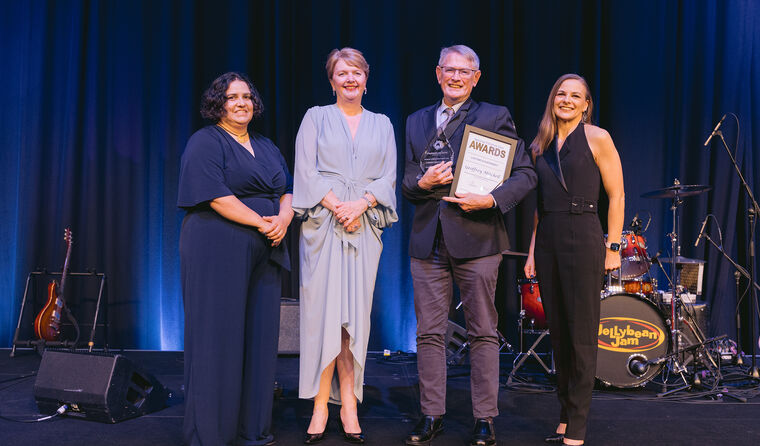News
GP honoured for outstanding palliative care
A Queensland GP who ‘walks the journey’ with his patients says it allows them to live their best life.
 Professor Geoffrey Mitchell after receiving his award, with MC Jean Kittson.
Professor Geoffrey Mitchell after receiving his award, with MC Jean Kittson.
Every GP who sees anyone aged over 70 is providing palliative care.
That is what Professor Geoffrey Mitchell, a GP and previous partner at Limestone Medical Centre in Ipswich, Queensland, believes.
Having been a GP with a special interest in palliative care at the same practice for almost four decades, Professor Mitchell told newsGP many people get into palliative care because they’ve had an ‘awful experience’ of a parent or relative dying.
But that wasn’t the case for him.
‘I saw it as a challenge to do a complicated thing well, and to find ways of making the difficult, more straightforward,’ he said.
‘And I really enjoy that challenge, but I also enjoy walking the journey – you develop very strong friendships over time with your patients.
‘As they get towards the end of their life, and they start to struggle more, that relationship is actually a really big part of the treatment. It says to the person that they are valued and cared for no matter how well or unwell they are and … I try to make their life as fulfilling as possible.
‘It’s an enormously satisfying thing, I see it as a clinical challenge to do well as a GP.’
Last week Professor Mitchell, who is an RACGP Fellow and Emeritus Professor at the University of Queensland’s School of Medicine, was recognised for his valuable role in the community when he received a Lifetime Achievement Award at the 2023 National Palliative Care Awards in Sydney.
A part of the Oceanic Palliative Care Conference program, the awards acknowledge all areas of the multidisciplinary team approach to palliative care by honouring the significant contributions of professionals and volunteers in this space.
Professor Mitchell said he was humbled to be recognised.
‘The award is basically for people who are doing a fair bit of palliative care, mostly people who are doing it on a full-time basis,’ he said.
‘As a GP doing it intermittently, I have worked with a lot of people in a collaborative capacity, so to get the award in a room full of full-time palliative care professionals was quite extraordinary.
‘It’s a recognition of the quality of care that is delivered in the community and that someone who works in that way has been recognised, is a huge honour.’
 (L–R) Professor Meera Agar, Palliative Care Australia Chair; Camilla Rowland, Palliative Care Australia CEO; Professor Geoffrey Mitchell; Carolyn Bell, Silverchain NSW Executive Director.
(L–R) Professor Meera Agar, Palliative Care Australia Chair; Camilla Rowland, Palliative Care Australia CEO; Professor Geoffrey Mitchell; Carolyn Bell, Silverchain NSW Executive Director.
In addition to his work in the palliative care space as a GP, Professor Mitchell has published more than 300 peer-reviewed papers, 40 books and various other publications, and regularly speaks nationally and internationally at events on the topic.
He believes GPs are all part of the palliative care journey.
‘People tend to shy away from doing palliative care but if you’re a generalist … you look after people from the day they’re born till the day they die,’ he said.
‘It should be an everyday part of all GPs’ work. I just want to encourage GPs to look at the way they manage older people in a different light and think more about how you can fulfill that obligation which you have.
‘Like every other GP who sees anyone over 70, you are doing palliative care whether you think you are or not.’
Some years ago, Professor Mitchell was part of a team who helped set up a hospice which operates as an inpatient unit. Alongside other GPs, he rotates through the on-call roster, and when someone’s GP is unavailable, he’ll step in.
‘I’ve got maybe one or two patients pretty well all the time, so the end-of-life care is something that I do routinely that way,’ he said.
‘I look after all the people and walk the journey with them as they get older and start to accumulate more and more problems and try to anticipate when it’s getting to the end and prepare for that.’
According to Professor Mitchell, most people think of palliative care as being the last few weeks of life, whereas end-of-life care is a subsidy of palliative. And any GP working with older people is providing palliative care.
‘The reality is [GPs] are very good at saving lives, but really what we’re doing is deferring death,’ he said.
‘At some point, something is going to go wrong, or it will be an accumulation of small things that really add up, and you can see it coming, the person who struggles more to get around and needs more and more help to do things.
‘Our job as a GP and in fact, as any health professional, is to try to prevent those things from happening.
‘And if you can’t prevent it, at least allow the person to be prepared for the end and to plan for things that are likely to go wrong. And to allow them to live the best life they can.’
Log in below to join the conversation.
lifetime achievement award palliative care Palliative Care Australia
newsGP weekly poll
Which of the following areas are you more likely to discuss during a routine consultation?